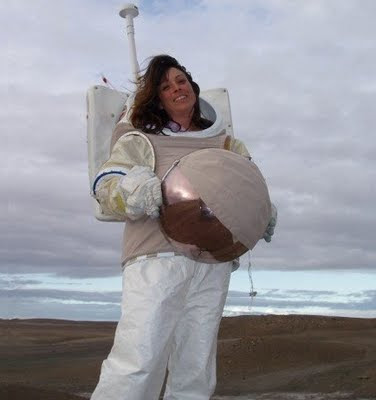So, did everyone sign up to win the Mars rock? It's been awhile since I turned my attention to my Mars fixation, so I thought now would be a good time to look around all the great Mars projects going on with various agencies and institutions.

Photo by Christine Pires on Devon Island, Baffin Bay, Nunavut
(Crew Vehicle compliments of NASA Edge)
(Crew Vehicle compliments of NASA Edge)
This past year, it's been my pleasure to meet a fantastic lady through Facebook who "worked on Mars" for nearly four years! Christine Pires was the System Support Specialist at the Haughton-Mars Project (HMP), a NASA and CSA project managed by The Mars Institute.
Christine provided network support for planetary wireless communications in the Canadian High Arctic, and is featured in many parts of their photorgaphy archives in all sorts of research and simulation activities. Wow! But, brrrrr.
The territory for Mars analog simulations is named for the Haughton Impact Crater, the 41-mile diameter site of an ancient meteorite crash, estimated to have hit the Earth nearly 40 million years ago.

Christine's description of the Canadian High Arctic:
"Snack food for the polar bears??"
"Snack food for the polar bears??"
Ms. Pires followed the HMP online for many years, spent another handful of years expanding her skills set and getting to know one of the Principal Investigators of the project. She then spent four full seasons with many crews and graduate students. Upon being asked about highlights, says she was constantly "honored and amazed at all the sciency types" and that it was "one of the very best experiences of my life without question".
What's amazing to me is how many people involved in space simulations all over the globe (most prominently Utah, the Arctic, Russia and the Antarctic) say the same thing! The Mars Institute, in addition to FMARS, also run the Mars-1 Humvee Rover and the Romance to Reality project.
Follow Christine, aka the Planetary Network Support Goddess on Twitter, and also check out the Haughton-Mars Project Photostream archives on Flickr!




